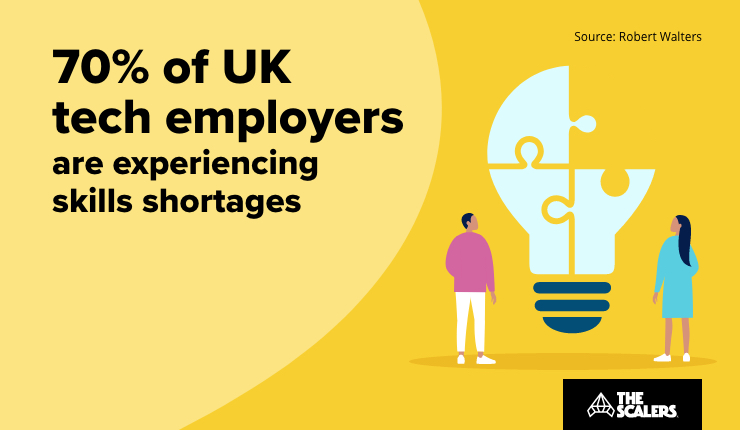Overcoming IT recruitment challenges

Tech skills shortages in North America and Western Europe aren’t new. In fact, this March saw a major UK thinktank declare that the country is heading towards a “catastrophic” digital skills shortage “disaster”. Likewise, retaining elite talent is also a challenge with employee engagement an enormous part of what makes a particular role fulfilling. On top of that, hiring professionals in HR departments have a global pandemic to content with, alongside all of its resultant permutations.
Job losses, mental health issues, and a foreboding economic downturn are just three factors that face those in charge of hiring top talent. And of course, the race for elite skills that appears to be getting more competitive with each year as digital acceleration moves higher up more businesses’ agendas.
A battle for top talent
As industries continue to digitalise and evolve then so will the technology that enables it. And because of this, the race for top talent will become even more fierce. In the UK, North America, and Western Europe the IT field is increasing quicker than the number of elite developers.

As evidence of this 70% of UK tech employers are experiencing skills shortages and demand for developers in the UK increased by 15% in 2020 — a year which saw job losses more generally as a result of the pandemic. Perhaps a sign that the tech space was more immune than others to these disruptions because traditional industries looked to technology and software to help them maintain competitive advantage.
How to address recruitment challenges
Talking about the issues is one thing, but figuring out how to navigate and address recruitment challenges is something else. Then implementation is the final hurdle, especially if it means changing processes or redefining established hierarchies and models.
Learn more about our model – the smarter way to go offshore
LEARN MORE1. Redefine entry requirements
It’s a fairly common problem in many professions, where new graduates are expected to have experience when they’re fresh out of university. It’s a catch-22 situation. Indeed, traditionally it is still commonplace for companies to require either a degree or some other form of certification for skilled positions. However, with tech jobs it’s becoming increasingly standard for them to prioritise internal training and cultural fit to fill tech positions. And, also a more diverse pool of candidates such as older people changing careers and bringing a unique set of skills to the table. This is something we covered in our Diversity in Tech webinar.
2. Stand out from the pack
There are many ways organisations can stand apart from rivals when looking to be the first choice among prospective candidates. LinkedIn found that 75% of people who are looking for a job consider an employer’s brand before deciding to apply. Additionally, your social media output can help engage would-be employees and help steer them in your direction. And, 92% of people would consider changing jobs if offered a role with a company with an excellent corporate reputation.

On top of this, continual engagement is key to retain the best engineers. Employee wellness initiatives, professional and personal development, and genuine recognition are some of the ways to facilitate this as we discussed in our article 5 Ways to Improve Employee Engagement in Your Organisation. An authentic company culture that’s easily definable is a way to help get around recruitment challenges.
3. Deliver on diversity
The digital transformation we’re seeing across society is also of course happening in tech hiring circles, where there now exists an opportunity to blend intelligent solutions with a human approach to create a more diverse and inclusive workforce. For example, advanced skill and personality assessment platforms provide objective results and an unbiased way of evaluating candidates.
With 20% of technology employers agreeing they need to encourage more females into the sector and a growing understanding of the real value diversity brings to an organisation, delivering on these initiatives is key. How to do it? Make sure your company is genuinely inclusive, and embraces difference instead of a ‘one size fits all’ approach as a way to overcome recruitment challenges.

4. Embrace remote
As we head into the second half of 2021, it’s clear that remote work is here to stay, whether that means fully remote or a hybrid model. When accountancy giant PwC recently announced a ‘start when you like’ policy, it was another sign that flexible work isn’t going anywhere. The remote revolution perhaps hasn’t been as fully fledged as some predicted a year ago, with people speculating that the office was now a thing of the past. However, significant changes will outlast the pandemic and its recovery.
The option to work from home is a big draw for the vast majority of tech employees. In many cases, when it comes down to choosing between two companies, it’s a deal breaker. Offering flexible working policies was always desirable, but after recent events it’s almost a requirement and will continue to be so.

Your crash course on everything offshoring. What is it? How does it work? Is it for you?
DOWNLOAD EBOOKIT recruitment challenges: a conclusion
The Covid crisis thrust operational efficiency to the forefront of businesses remaining viable. There were some important tech hiring lessons learned during the pandemic, such as:
- De-siloing teams and flattening certain hierarchical decision making processes — are going to help business on their road to recovery and to maintain competitiveness going forward.
- To overcome tech hiring challenges, hiring departments ought to take some of these pandemic-fuelled operational efficiencies into their new operating models.
- Offshore teams can help drive innovation by giving organisations access to elite global development talent that they wouldn’t be able to source locally.
If you’re interested in building a highly engaged development team in the heart of Bangalore, India, feel free to reach out to us by filling out the contact form. One of our senior executives will get back to you within 24 hours.















